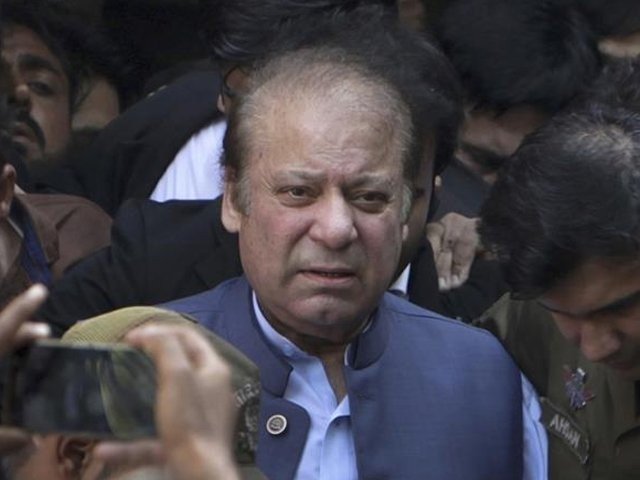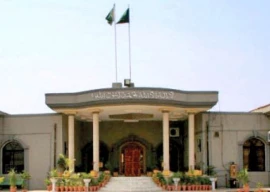
The PTI led federal government has decided to hold fresh investigations into the Hudabiya Paper Mills case – a corruption case registered against former prime minister Nawaz Sharif and his family during General Pervez Musharraf’s rule and closed on order of the Supreme Court in 2017.
“The government has decided that Hudabiya Paper Mills case requires fresh investigation. In this connection, the government is giving instructions to relevant departments to reinvestigate the case,” Minister for Information Fawad Chaudhry said in a series of social media posts on Monday.
آج وزیر اعظم عمران خان کو قانونی ٹیم نے شہباز شریف کے مقدمات کے حوالے سے تفصیلی بریفنگ دی، حکومت نے یہ فیصلہ کیا ہے کہ حدیبیہ پیپر ملز کا مقدمہ نئے سرے سے تفتیش کا متقاضی ہے اور اس سلسلے میں متعلقہ اداروں کو تفتیش نئے سرے سے شروع کرنے کی بدایات دی جارہی ہیں ،
— Ch Fawad Hussain (@fawadchaudhry) May 10, 2021
“The Hudabiya case is the most significant way to unravel the corruption of Sharif family. In this case Nawaz Sharif and [PML-N President] Shehbaz Sharif are the main accused.
حدیبیہ کا مقدمہ شریف خاندان کی کرپشن کا سب سے اہم سرا ہے، اس مقدمے میں شہباز شریف اور نواز شریف مرکزی ملزم کی حیثئیت رکھتے ہیں، جو طریقہ حدیبیہ میں پیسے باہر بھیجنے کیلئے استعمال ہوا اسی کو بعد میں ہر کیس میں اپنایا گیا۔ اس لئے اس کیس کو انجام تک پہنچانا از حد اہم ہے
— Ch Fawad Hussain (@fawadchaudhry) May 10, 2021
“The manner adopted in laundering money through Hudabiya [Paper Mills] was later replicated [by the Sharifs] in other cases as well. That is why it is vital to take this case to its logical conclusion,” he added.
According to the information minister, this decision was taken in Prime Minister Imran Khan’s meeting with his legal team. The team earlier also gave the premier a detailed briefing on cases against Shehbaz, who recently not only secured a bail relief but also the permission to fly abroad for medical treatment.
The National Accountability Bureau (NAB) filed the reference in 2000 accusing the entire Sharif family of misappropriating Rs1.24 billion using the mills – an amount which it claimed was “unexplainable and disproportionate” to their known sources of income.
The Lahore High Court (LHC), however, quashed the reference in 2014 and NAB did not make any attempt to challenge the LHC verdict in the Supreme Court.
However, in September 2017, NAB finally decided to challenge the three-year-old LHC judgment in the Supreme Court, which on December 15, 2017 rejected NAB’s appeal. NAB filed a review petition against the December 15 order which the same three-judge bench threw out on October 30, 2018.
According to sources, the government will refer the matter to the Federal Investigation Agency (FIA) for a fresh investigation. However, some legal experts believe that the principle of double jeopardy may apply to any such move as the case has already been decided by the top legal forum of the country.
Also read: Hudaibiya Paper Mills case: Top court throws out NAB’s review plea
A senior government official, however, contended that the principle of double jeopardy cannot be applied in this case in which trial could not conclude. “If the Sharif family members have any issue then they may approach a legal forum for redressal of their grievances,” he added.
The PML-N’s legal team is completely satisfied that the matter cannot be reopened in view of the SC’s December 2017 decision. Political analysts believe after the bail of Shehbaz Sharif, the PTI government is in panic as it fears that the PML-N is going to replace it after the general election.
“The PTI government’s performance is very poor and therefore it is paying full attention to save its drive against graft which can be helpful to gain support from the public in next general elections,” said an expert.
In January 2018, the Supreme Court while hearing NAB’s review petition held that Sharif family members were denied due process in the 17-year-old Rs1.2 billion corruption reference.
The three-judge bench – comprising Justice Mushir Alam, Justice Qazi Faez Isa and Justice Mazhar Alam Khan Miankhel – had issued a 36-page detailed judgment on the dismissal of NAB appeal.
“We have come to the painful conclusion that respondents 1 through 9 (all Sharif family members) were denied due process. The legal process was abused, by keeping the reference pending indefinitely and unreasonably.
“The said respondents were denied the right to vindicate themselves. The reference served no purpose but to oppress them. We have also noted with grave concern the lack of commitment and earnestness on the part of NAB at the relevant time.
“NAB did not produce the accused in court… seek to have charges framed against them… examine a single witness [or] tender evidence,” says the judgment authored by Justice Isa.
Read more: 'Ex-PM Sharif ousted through judicial coup’
The judgment also noted that a joint investigation team’s (JIT) report referred to “money laundering” that took place in 1991 and 1992.
“However, money laundering was [not] made an offence in Pakistan [until September 7, 2007,] when the Anti-Money Laundering Ordinance was enacted... Additionally, a money laundering case is to be tried by a sessions court, and not by an accountability court, under the NAB Ordinance,” said the order.
Justice Isa, while referring to several articles of the Constitution, observed that a person cannot indefinitely await the pleasure of a prosecuting agency to prosecute him. “If this is allowed prosecution becomes persecution, and persecution (or oppression) is worse than death.”
Umer Gilani advocate said what the Supreme Court bench headed by Justice Mushir Alam and the LHC bench headed by Justice Ijazul Ahsan applied in the case are two well-settled principles of criminal law.
"Firstly, if a prosecution is carried out in a vexatious and dilatory manner, as was the case of NAB's prosecution in the Hudabiya reference, it is liable to be quashed. This principle was applied in the case of Muhammad Hussain vs State back in the 1960s and is followed all over the world.
“The second principle is the prohibition on double jeopardy. Once the prosecution against an accused is quashed, with or without trial, it cannot be started afresh," he added.
Gilani said these constitutional principles were evolved by English jurists of the medieval era as a check on the tyranny of despotic monarchs. “Pakistan's recent history proves that these principles are as relevant today as they were in medieval times,” he added.



















COMMENTS
Comments are moderated and generally will be posted if they are on-topic and not abusive.
For more information, please see our Comments FAQ